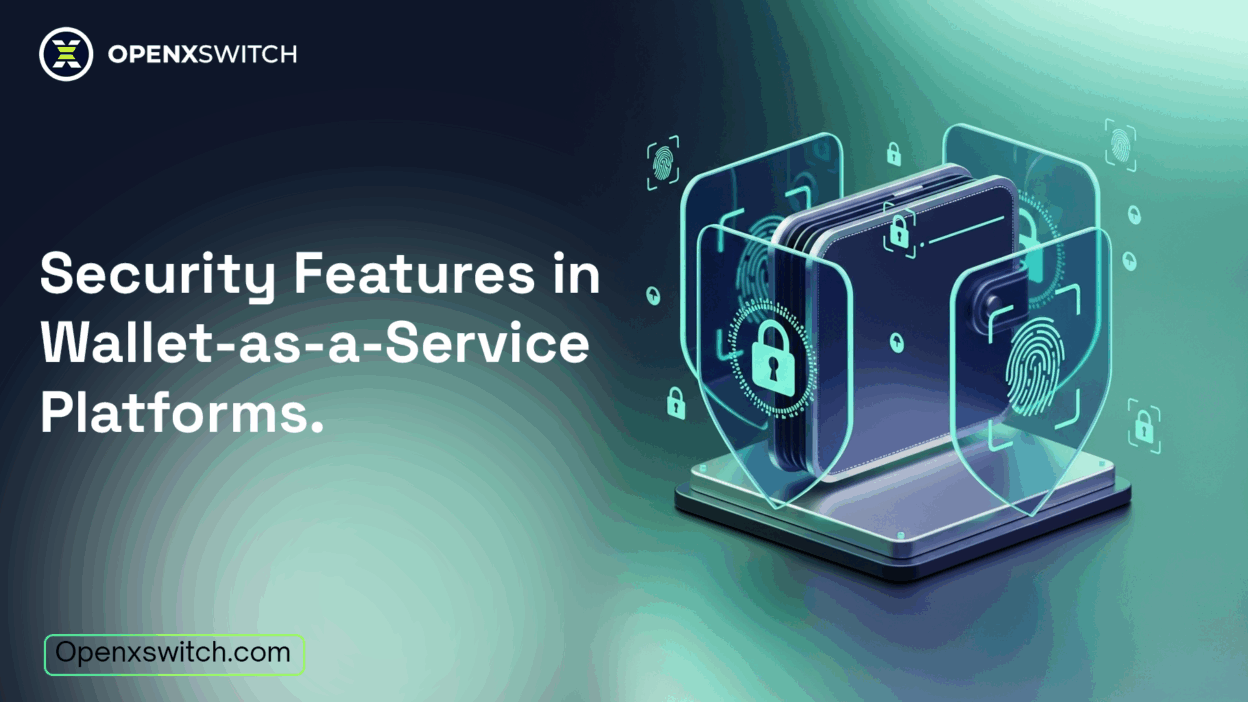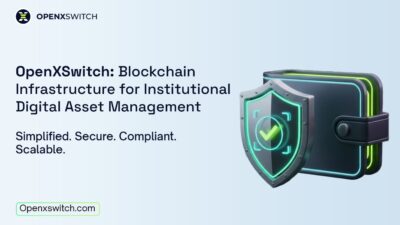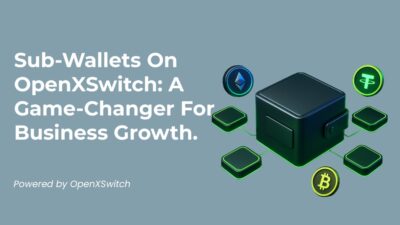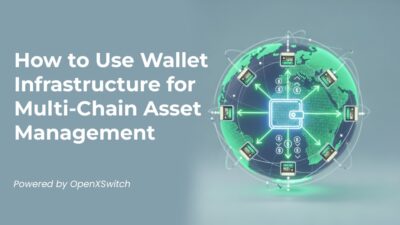In the rapidly evolving digital asset ecosystem, security remains the cornerstone of trust between platforms and their users. As digital asset businesses, exchanges, and fintech companies increasingly adopt Wallet as a Service (WaaS) solutions, understanding the security infrastructure that protects customer funds becomes paramount. At OpenXSwitch, we’ve built our wallet infrastructure on multiple layers of enterprise-grade security features designed to safeguard digital assets while maintaining operational efficiency.
Hierarchical Deterministic (HD) Wallets: The Foundation of Scalability and Security
OpenXSwitch, like most modern wallet infrastructures, provides Hierarchical Deterministic (HD) wallets to digital asset businesses and exchanges. HD wallets generate a tree-like structure of cryptographic keys from a single master seed, allowing platforms to create unlimited wallet addresses while maintaining a single backup point.
This architecture offers several critical advantages:
- Simplified Backup Management: A single master seed secures an entire hierarchy of wallets, eliminating the need to back up each individual private key
- Improved Privacy: Each transaction can use a unique address, making it significantly harder to trace user activity across the blockchain
- Operational Efficiency: Businesses can generate new addresses on-demand without compromising security
- Deterministic Recovery: Lost wallets can be completely restored from the master seed, ensuring funds are never permanently inaccessible
For exchanges and digital asset platforms handling thousands of user accounts, HD wallets provide the scalability needed to grow without compromising on security standards.
Multi-Party Computation (MPC): Eliminating Single Points of Failure
Traditional cryptocurrency wallets rely on a single private key. This means that whoever controls that key, controls the funds. This creates an inherent vulnerability: if the key is stolen, lost, or compromised, the assets are at risk. OpenXSwitch addresses this fundamental security challenge through Multi-Party Computation (MPC) technology.
How MPC Key Sharing Works
Rather than storing private keys in a single location, MPC distributes the cryptographic key material across multiple parties or secure environments. Here’s what makes this approach revolutionary:
Distributed Key Generation: The private key is never created in its complete form. Instead, mathematical “shares” of the key are generated independently across multiple secure nodes. No single party ever possesses the complete key.
Threshold Signatures: When a transaction needs to be signed, the distributed key shares collaborate to create a valid signature without ever reconstructing the complete private key. OpenXSwitch implements threshold signature schemes where a predetermined number of parties (for example, 2-of-3 or 3-of-5) must participate to authorize transactions.
Cryptographic Security Without Compromise: MPC provides the same cryptographic security guarantees as traditional private keys, but eliminates the single point of failure. Even if an attacker compromises one key share, they cannot access funds or sign transactions without the threshold number of shares.
Dynamic Key Refresh: Advanced MPC implementations, like the one used by OpenXSwitch, support periodic key rotation without changing the blockchain addresses. This means the underlying key material can be refreshed to maintain security over time, even if partial information has been exposed.
The practical implications are significant: internal threats are minimized, external attacks require compromising multiple independent systems simultaneously, and operational risks from lost credentials are dramatically reduced.
Role-Based Access Control: Precision Authorization
Security isn’t just about protecting cryptographic keys. It’s equally about controlling who can initiate actions within the system. OpenXSwitch implements granular role-based permission systems that ensure appropriate access controls throughout the platform.
Withdrawal Permissions: Not every team member needs the ability to initiate withdrawals. OpenXSwitch allows businesses to define specific roles, such as operators, administrators, developers, and viewers, with their precisely tailored permissions. Critical actions like withdrawals can require multiple approvals, creating an internal checks-and-balances system.
Hierarchical Approval Workflows: For high-value transactions, OpenXSwitch supports multi-level approval workflows. A junior operator might initiate a withdrawal request, but it requires approval from senior management before execution.
This layered authorization approach transforms security from a binary “access or no access” model into a nuanced system that reflects real organizational structures and risk management policies.
Address Whitelisting: Controlled Destination Security
One of the most effective security measures against unauthorized withdrawals is address whitelisting. OpenXSwitch ensures prime wallet whitelisting capabilities that add an essential layer of protection:
Pre-Approved Destinations: Only blockchain addresses that have been explicitly whitelisted can receive withdrawals. This prevents attackers who might gain temporary access from redirecting funds to their own addresses.
Transaction Monitoring with Industry-Leading Analysis Tools
Protecting customer assets is also about ensuring that the platform doesn’t inadvertently facilitate illicit activities. OpenXSwitch integrates with leading blockchain analysis and compliance tools to monitor transactions in real-time:
Chainalysis Integration
Chainalysis provides comprehensive blockchain intelligence, helping identify connections between addresses and known illicit activities. OpenXSwitch leverages this data to:
- Screen incoming deposits against addresses associated with ransomware, darknet markets, or sanctioned entities
- Flag high-risk transactions for additional review before processing
- Maintain compliance with evolving regulatory requirements across jurisdictions
OFAC Sanctions Screening
The Office of Foreign Assets Control (OFAC) maintains lists of individuals, entities, and cryptocurrency addresses associated with sanctioned activities. OpenXSwitch automatically screens transactions against these lists, preventing the platform from interacting with prohibited addresses and ensuring compliance with international sanctions regimes.
Bitcoin Abuse Database Monitoring
The Bitcoin Abuse database crowdsources reports of addresses used in scams, ransomware attacks, and fraud. By cross-referencing transactions against this database, OpenXSwitch provides an additional layer of customer protection, warning users or blocking transactions involving addresses with documented abuse histories.
Real-Time Risk Scoring
Rather than simple binary allow/deny decisions, OpenXSwitch’s integrated monitoring provides risk scores for transactions based on multiple factors. This enables nuanced decision-making: low-risk transactions proceed automatically, medium-risk transactions might require additional verification, and high-risk transactions are held for manual review.
This proactive approach to transaction monitoring protects not only individual users but also safeguards the platform’s reputation and regulatory standing.
Comprehensive Security: More Than the Sum of Its Parts
What makes OpenXSwitch’s security architecture truly effective isn’t any single feature, but rather how these components work together synergistically:
- HD wallets provide the scalable foundation for managing thousands of addresses
- MPC key sharing eliminates single points of cryptographic failure
- Role-based permissions ensure internal controls and accountability
- Address whitelisting prevents unauthorized fund movements
- Real-time transaction monitoring catches suspicious activities before they cause harm
This defense-in-depth strategy means that even if one security layer is compromised, multiple additional protections remain in place.
Learn more about OpenXSwitch here
Experience Enterprise-Grade Security with OpenXSwitch
Security shouldn’t come at the cost of functionality. OpenXSwitch delivers institutional-grade protection while offering the features modern digital asset businesses demand:
- 700+ Tokens Supported: Trade and swap across a vast ecosystem of digital assets
- Zero Internal Transaction Fees: Optimize your operational costs without compromising security
- Real-Time Webhook Monitoring: Stay informed of every transaction as it happens
- Developer-Friendly APIs: Integrate seamlessly with comprehensive documentation
Whether you’re launching a new exchange, building a fintech application with crypto capabilities, or scaling an existing digital asset platform, OpenXSwitch provides the secure infrastructure you need.
Ready to Learn More?
Explore Our Documentation: Get technical details on our API Docs.
Visit Our Website: Discover the full range of OpenXSwitch capabilities.
Schedule a Sales Call: Speak with our team about your specific security requirements.



